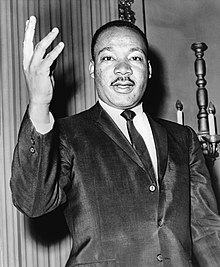Assassination of Martin Luther King Jr.
| Assassination of Martin Luther King Jr. | |
|---|---|

King in 1964
|
|
| Location |
Lorraine Motel Memphis, Tennessee |
| Coordinates | 35°08′04″N 90°03′27″W / 35.1345°N 90.0576°WCoordinates: 35°08′04″N 90°03′27″W / 35.1345°N 90.0576°W |
| Date | April 4, 1968 6:01 p.m. (Central Time) |
|
Attack type
|
Sniper assassination |
| Weapons | Remington 760 Gamemaster .30-06 |
| Victim | Martin Luther King Jr. |
| Perpetrators |
|
| This article is part of a series about Martin Luther King Jr. |
|
|---|---|
|
Campaigns
Death and memorial
|
|
Campaigns
Death and memorial
Martin Luther King Jr. was an American clergyman and civil rights leader who was fatally shot at the Lorraine Motel in Memphis, Tennessee, on April 4, 1968. King was rushed to St. Joseph's Hospital, where he was pronounced dead at 7:05 p.m. that evening. He was a prominent leader of the Civil Rights Movement and Nobel Peace Prize laureate who was known for his use of nonviolence and civil disobedience.
James Earl Ray, a fugitive from the Missouri State Penitentiary, was arrested on June 8, 1968, in London at Heathrow Airport, extradited to the United States, and charged with the crime. On March 10, 1969, Ray entered a plea of guilty and was sentenced to 99 years in the Tennessee State Penitentiary. Ray later made many attempts to withdraw his guilty plea and be tried by a jury, but was unsuccessful; he died in prison on April 23, 1998, at the age of 70.
The King family and others believe that the assassination was carried out by a conspiracy involving the U.S. government, as alleged by Loyd Jowers in 1993, and that Ray was a scapegoat. In 1999 the King family filed a wrongful death lawsuit against Jowers for the sum of $10,000,000. During closing arguments, the King's attorney asked the jury to award damages of $100.00, to make the point that "it was not about the money." During the trial both the family and Jowers presented evidence alleging a government conspiracy. The government agencies accused could not defend themselves or respond because they were not named as defendants. Based on the evidence, the jury concluded that Jowers and "others were part of a conspiracy to kill King." and awarded $100.00. The allegations and the finding of the Memphis jury were later rejected by the United States Department of Justice in 2000.
...
Wikipedia

